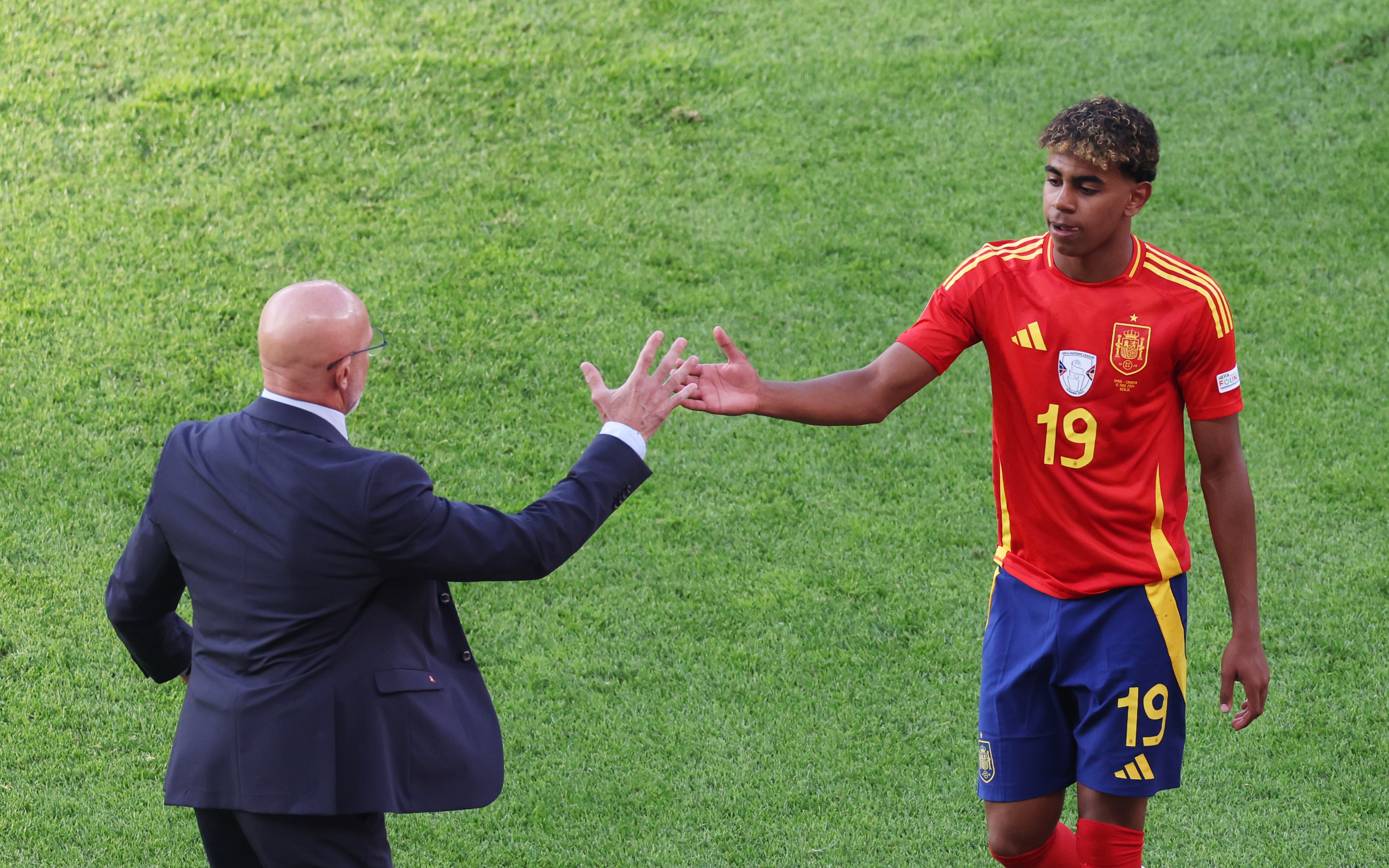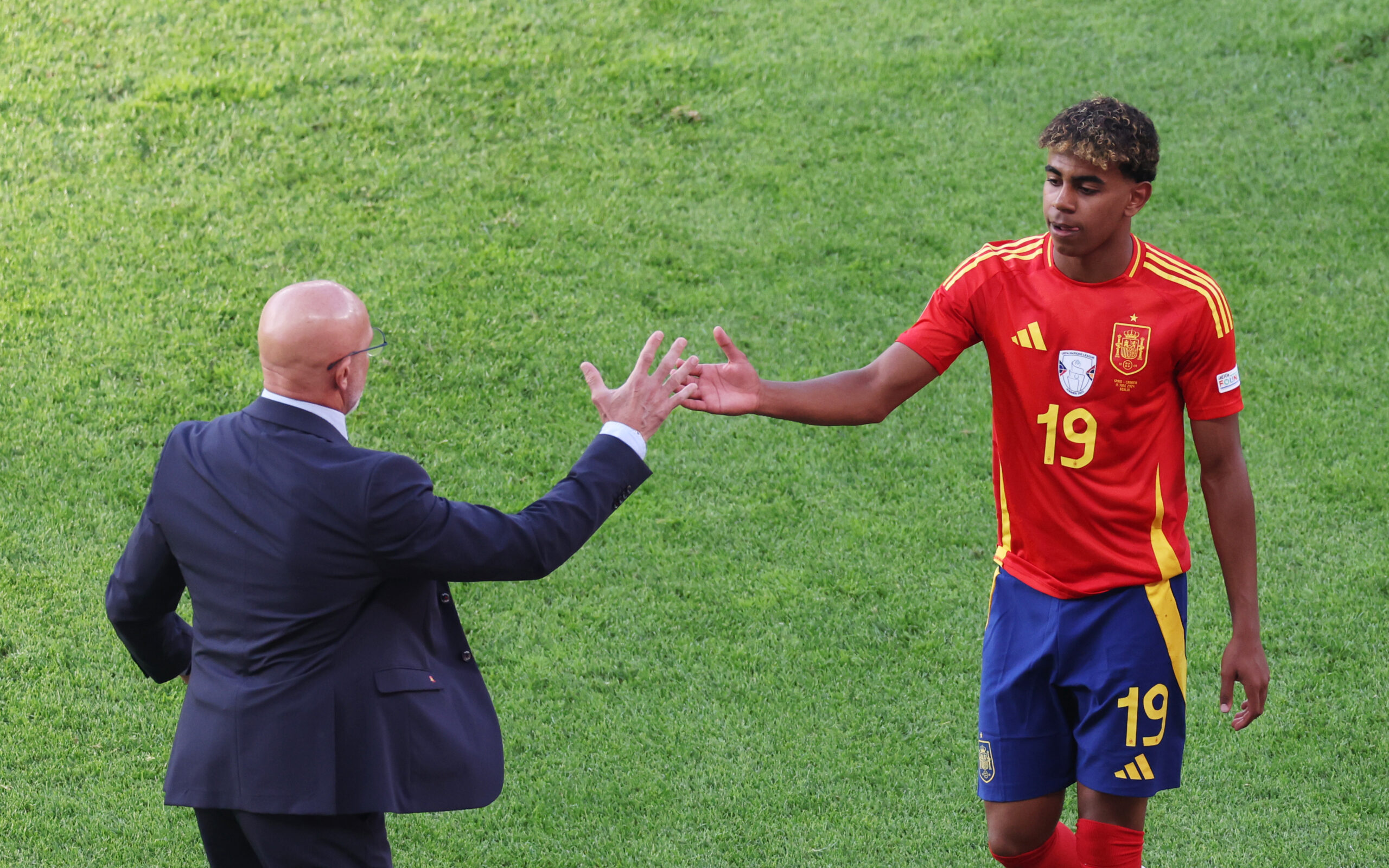Lamine Yamal’s Inclusion Sparks Outrage: Barcelona Prioritizes Health Over National Pride in World Cup Qualifiers
The recent deliberations surrounding Lamine Yamal’s potential inclusion in Spain’s national team for the upcoming November international break are not just about a young talent’s health or performance. They unveil deeper tensions between national duty and club responsibilities, sparking a divisive discourse reminiscent of the clash between individual welfare and collective ambition seen in contemporary societies.
As soccer evolves into a global phenomenon, with players juggling club commitments and international expectations, decisions about player welfare have come under intense scrutiny. The case of Lamine Yamal, the promising 16-year-old forward from FC Barcelona, is emblematic of a larger conflict that resonates deeply within sports, where the stakes are incredibly high not only for teams but for the players themselves.
With Luis de la Fuente, the national coach, set to announce his squad, the focus is on whether Yamal will be called up despite suffering from persistent groin issues. This highlights a critical juncture in player management: how to balance a player’s immediate physical health with the pressing demands of national representation, particularly during an essential qualification window for the 2026 World Cup.
FC Barcelona’s management, clearly illustrating their commitment to the player’s long-term health, has strongly indicated that Yamal should remain in Spain to recuperate fully from his ongoing physical issues. The club aims to ensure that their young star recovers without the pressures of international fixture congestion weighing on him. This approach is not just a medical decision; it resonates with a broader philosophy of safeguarding athletes who are often seen as mere commodities in high-stakes sports.
Players today are often thrust into the limelight at a young age, and the physical toll that come from incessant demands can have lasting repercussions. In Yamal’s case, after his high-demand participation in matches like El Clásico and key Champions League encounters, doubts linger about whether he can sustain the rigors of international play without risking further injury. He has been performing astonishingly well on the pitch, contributing significantly to Barcelona’s successes; nevertheless, the reality of his physical condition begs consideration.
De la Fuente’s stance, which seemingly prioritizes a player’s recent performance and contributions at the club level over medical concerns, underscores a different mentality. He argues that if Yamal is fit enough to compete at the highest levels with Barcelona, he should also be considered capable of representing his country. This perspective reflects a pressing urgency to secure Spain’s qualification for the World Cup, showing how national pride often battles the pragmatic approach of health management.
Moreover, this ongoing debate brings to light historical precedents in soccer where player welfare has been sacrificed for the sake of national glory. Revisiting similar instances in soccer reveals a pattern whereby national coaches often feel compelled to leverage the full capabilities of their best players, sometimes disregarding underlying health issues. This reflects a societal trend where collective aspirations overshadow individual concerns, sparking controversy and, at times, outrage among fan bases and medical professionals alike.
While both sides have expressed an intent to reach a mutually beneficial agreement, the potential for conflict is evident. The concern from FC Barcelona is compounded by past experiences, such as when players return from international duty injured after excessive minutes logged in high-pressure situations. The resulting fallout can lead to extensive absences that threaten club performance and disrupt player development, creating a cyclical dilemma.
Yamal’s youthful exuberance and exceptional talent undoubtedly make him a valuable asset, yet the societal expectation for him to perform can be an overwhelming burden. As society sits at the nexus of sports and wellness, many advocate for a reassessment of how we prioritize health over achievement, particularly when it comes to young athletes like Yamal.
This situation has ignited a discourse that extends beyond the confines of soccer, touching upon ethics in sports, the responsibilities of clubs versus national teams, and the long-term health implications for young athletes. The tension between competing interests challenges the very nature of sportsmanship, raising vital inquiries about the direction of athlete care amid relentless competitive pressures.
As the anticipated announcement approaches, the stakes grow higher, encapsulating a narrative that reflects not merely a sporting decision but a broader reflection of values inherent in modern athletic culture where health should be a priority, even when national pride is at stake. This conversation mirrors the complexities of modern society, urging a reconsideration of prioritizing individuals—especially young ones—over collective ambitions in the fast-paced realm of professional sports.

This Friday, the list of call-ups by Luis de la Fuente for the November international break will be announced, a crucial window that could secure Spain’s qualification for the 2026 World Cup. The focus is once again on the presence of Lamine Yamal, the young promise from FC Barcelona, who might rejoin ‘La Roja’ despite persistent groin problems.
The Barcelona management has expressed their desire for the player to rest and use this period to focus on his recovery in Barcelona. The club’s goal is for him to fully overcome the physical discomfort that has recently hindered him. However, this stance seems not to be shared by the Spanish coach, who, according to various sources, is seriously considering including the young winger in the squad.
This situation has reignited the dispute over managing Yamal’s playing time, an issue that has previously caused friction. Barça’s concern intensified after the first call-up of the season, from which the player returned with an injury after a high demand in minutes. Although the parties have sought to ease tensions, coordinating to manage the Silver Ball in his best interest remains a challenge.
Despite the reported discomfort and the club’s preference for his rest, Lamine Yamal’s performance in the first team has been remarkable. The forward has not only returned to the starting lineup after his brief absence but has actively participated in key high-demand matches like El Clásico and the Champions League, demonstrating that he is competing at the highest level with the club, with goals and assists.
For Luis de la Fuente, the player’s performance with FC Barcelona is the determining factor. The national coach maintains that if the young talent is performing at full capacity with his team in the European elite, he should be available to help the National Team secure their place in the World Cup. Therefore, the final decision on his inclusion will depend on his physical condition in the days leading up to the announcement of the list, keeping the debate in suspense.
This article was translated into English by Artificial Intelligence. You can read the original version in 🇪🇸 here.
📸 Alex Livesey – 2024 Getty Images

